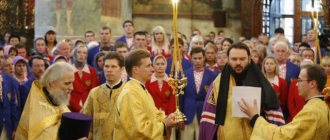The Sinner's Lament
Weep for my nakedness, my beloved brothers. I angered Christ with my vicious life. He created me and gave me freedom, but I repaid Him with evil. The Lord created me perfect and made me an instrument of His glory, so that I would serve Him and sanctify His Name. But I, unfortunate one, made my members instruments of sin and committed unrighteousness with them. Woe is me, for He will judge me! I relentlessly beg You, my Savior, cover me with Your wings and do not reveal my defilements at Your great judgment, so that I may glorify Your goodness. The evil deeds that I have done before the Lord separate me from all the saints. Now grief befalls me, which is what I deserve. If I had labored with them, then, like them, I would have been glorified. But I was relaxed and served my passions, and therefore I do not belong to the host of victors, but became the heir of Gehenna. I persistently pray to You, the Victor pierced by nails on the Cross, my Savior, to turn Your eyes away from my wickedness, and with Your sufferings heal my ulcers, so that I may glorify Your goodness.
Prayer for repentance of sins
Lord Jesus Christ, Son of God. I sincerely repent to you and ask for your generous forgiveness. Forgive me all my sins through oblivion, swearing, abuse, insults to my neighbor and cleanse my soul from sinful thoughts. Protect me from the deeds of unrighteousness and do not torment me with too difficult trials. May your will be done now, and forever, and forever and ever. Amen.
Prayer of repentance (Read every day after evening prayers)
Lord, Lord! Here I am all before You, a great sinner. I have sinned a lot even today. Have mercy on me, Lord, drive out of me anger, pride, irritation, condemnation, pride and all other passions, and instill in my heart humility, meekness, generosity and all virtue. Lord, help me to fulfill Your will, put me on the true path of salvation. Teach me, Lord, to keep Your commandments and to bring sincere repentance with contrition and tears. God! Forgive me my sins by which I have offended Your goodness. Have mercy on me, who have been corrupted by iniquities, and with Your mercy forgive me, a sinner. Amen.
A prayer of repentance that asks Jesus Christ for speedy forgiveness of sins
Lord Jesus Christ, Son of God. Have mercy on me and forgive me all sins committed with malicious intent and not according to my will. I repent for the insults caused, the caustic words and the nasty deeds. I repent for the mental turmoil and lamentation of a difficult life. Forgive me all my sins and drive away demonic thoughts from my soul. Let it be so. Amen.
Source: https://www.orthodoxy.com.ua/molitva_o_pokayanii.html
Prayer of repentance
A prayer to God, said by a person who has realized his need for a Savior and forgiveness of sins, is called a prayer of repentance. This prayer in itself cannot lead to salvation, but only sincere repentance, understanding of one’s sinfulness and the need for salvation.
The first aspect of the prayer of repentance is the recognition of our sinfulness. The text in Romans 3:10 reads, “There is none righteous, not even one.” The Bible clearly states that we have all sinned. We are all sinners in need of God's mercy and forgiveness (Titus 3:5-7) because because of our sin we deserve eternal punishment (Matthew 25:46). Thus, the prayer of repentance is a plea for mercy instead of just punishment.
The second aspect of this prayer is an understanding of what God has done to correct our deplorable condition. He took on a body and became a man—Jesus Christ (John 1:1, 14). Jesus revealed to us the truth about God and lived a righteous and sinless life (John 8:46; 2 Corinthians 5:21). Then He died on the cross in our place, taking upon Himself the punishment intended for us (Romans 5:8). The fact that Jesus rose from the dead proves His victory over sin, death and hell (Colossians 2:15; 1 Corinthians 15). Only through this can we receive forgiveness of our sins, and we are also promised eternal life in heaven - if we only believe in Jesus Christ. All we have to do is believe that He died in our place and rose from the dead (Romans 10:9-10). We can be saved by grace alone, through faith alone, and in Jesus Christ alone. Ephesians 2:8 says, “For by grace you have been saved through faith, and this not of yourselves, it is the gift of God.”
When we say the prayer of repentance, we tell God that we trust Jesus Christ as our Savior. You don’t need any “magic” words for salvation. It is only through faith in the death and resurrection of Jesus that we receive salvation! If you realize that you have sinned and feel the need for salvation in Jesus Christ, then the following prayer of repentance that you can turn to the Lord will help you: “God, I know that I have sinned against You. I understand that I deserve to bear the consequences of my sin, but I believe in Jesus Christ as my Savior. I believe that His death and resurrection provided me with forgiveness. I trust Jesus, and Him alone, as my personal Lord and Savior. Thank You, Lord, for saving and forgiving me! Amen!"
Copyright
When writing this answer on the site, materials from the site were partially or fully used
Materials posted with permission of the copyright holder.
Owners of the Bible Online resource may partially or not at all share the opinion of this article.
Source: https://bibleonline.ru/qa/6-sinners-prayer
Prayer of repentance
Our life turns into a gloomy dungeon, from which we are desperately looking for a way out, but we do not understand why we got here. We are doing some things, fussing, rushing, but where? We have forgotten about the most important thing, that God loves us as we are. And not for anything good that we did to him, but just like that. When you know that you are loved, life becomes easier.
What is a prayer of repentance?
A prayer of repentance is the words spoken by a person to God, with an awareness of the need for his participation in human life. In this prayer, we admit our sinfulness, and ask for forgiveness for our actions and thoughts, and also ask the Lord to help us correct ourselves.
Prayers of repentance and forgiveness do not automatically mean salvation and deliverance from the severity of sins. They only show your repentance, which all human life should be full of.
Aspects of penitential prayer
The first thing that a prayer of repentance to the Lord should contain is humble repentance for what has been done. The Bible says that we are all sinners and we must admit it. Because of our sins, we deserve eternal punishment, but we ask God to have mercy on us and forgive us our sins.
Second, is the awareness of what God has done for us. God loves humanity and that is why he sacrificed his son for our salvation. He sent Jesus to Earth, who revealed the truth to us and lived a sinless life, dying on the cross for us. He took upon himself our punishment, and as proof of victory over sin, he rose from the dead.
Thanks to him, we seek God's forgiveness through the prayer of repentance for the remission of sins. All that is required of a Christian is to believe that Jesus died in our place and rose from the dead.
The best prayer of repentance is the one that a person says sincerely, which comes from the very heart, heated by true faith and awareness of his sinfulness. Repentance can be expressed in your own words, there is no need for special “magic” words and rituals, just ask God for forgiveness and he will hear you.
But it is still recommended to learn at least one prayer of repentance. Church prayers are good because they were written under the instructions of the saints. They represent a special sound vibration, because they consist not just of words, letters, sounds, but of what was spoken by a holy person.
The following prayer of repentance should be read daily:
“I confess to You, Lord my God and Creator, in the One Holy Trinity, glorified and worshiped Father, and Son, and Holy Spirit, all my sins, which I have committed all the days of my life, and for every hour, and now, and in past days and nights, by deed, word, thought, binge eating, drunkenness, secret eating, idle talk, despondency, laziness, bickering, disobedience, slander, condemnation, neglect, pride, avarice, theft, unspeaking, filthy gain, bribery, jealousy, envy, anger , memory of malice, hatred, covetousness and all my feelings: sight, hearing, smell, taste, touch and my other sins, both mental and physical, in the image of my God and Creator I have angered You, and my neighbor for being untruthful: regretting these, I blame myself for You I present it to my God, and I have the will to repent: then, O Lord my God, help me, with tears I humbly pray to Thee: You have come to forgive me my sins with Thy mercy, and forgive me from all these things that I have said before You, for You are Good and Lover of Mankind.”
In Christianity there is not only the practice of daily repentance, but also a special sacrament called Confession. In the sacrament of Confession, the believer repents of his sins before the Lord, pronouncing them before the priest. And the priest, endowed with power by God, forgives him these sins and instructs him in a righteous lifestyle.
Source: https://womanadvice.ru/molitva-pokayaniya
Prayers for the night before going to bed
Thoughts about life's problems often not only overwhelm a person during the day, but also prevent him from falling asleep at night. Insomnia, intermittent shallow sleep, scary visions are the result of nervous overload, stress, and depression. When heavy thoughts prevent you from sleeping, many turn to God for help, begging him to help free themselves from the difficulties that prevent them from sleeping peacefully. In this case, Orthodox prayers at night will be effective. Usually they are small in volume, but meaningful and sincere.
In the evening, the affairs of the day are usually summed up, so in prayer it is not at all necessary to ask for something, it is important to read it sincerely, turn to the Higher Powers with a story about the day, for advice, reasoning about your life, to thank the Higher Powers for their help and support.
If you read prayers at night before going to bed, they have a positive effect on the mental and physical state of the person praying. They will help you free yourself from worries, dark thoughts, and relieve insomnia and nightmares.
Prayer of repentance
Dear friend!
Welcome to the family of God!
If you have not yet accepted Jesus Christ as your Lord and Savior, we encourage you to turn to Him in prayer right now. God will give your soul true joy, peace and happiness. Only in God will you find answers to all your questions, only He will solve all your problems. Living with God, believing God is true happiness. God loves and is waiting for you. He needs you.
PRAYER OF REPENTANCE
I come to You in prayer, aware of all my sinfulness. I believe Your Word. I believe that You accept everyone who comes to You. Lord, forgive all my sins, be merciful to me.
I don't want to live my old life. I want to belong to you, Jesus!
Come into my heart, cleanse me. Be my Savior and Shepherd. Guide my life.
I confess You, Jesus Christ, as my Lord.
I thank You that You hear my prayer, and I accept Your salvation by faith.
Thank You, my Savior, for accepting me as I am. Amen".
If you sincerely prayed, then God heard you and forgave all your sins. Now God is your Father and Jesus is your friend. Read the Word, live with God, pray.
The Holy Spirit is the third person of the Divine Trinity. He is the One whom the Father sent to be with His children. The Holy Spirit speaks to us when we do wrong. He brings us back to the right path. We often cause Him grief. When we find ourselves in difficulty trying to figure out what is right and what is wrong, He helps us clear away the fog of doubt if we listen carefully to Him. The Holy Spirit will also teach you to discern true teachings from false ones. He will help you find a church where Jesus Christ is the head of the Christians.
PRAYER FOR THE BAPTISM OF THE HOLY SPIRIT
“Now I am born again! I am a Christian, a child of Almighty God! I'm saved! Lord, You said in Your word:
“If you, being evil, know how to give good gifts to your children, how much more will the heavenly Father give the Holy Spirit to those who ask him” (Luke 11:13).
I ask you, Lord, to fill me with the Holy Spirit.
Holy Spirit, rise within me as I praise God. I believe that I will speak in other tongues. Amen".
If you prayed the prayer of repentance, please write to us by e-mail: This e-mail address is being protected from spambots. You need JavaScript enabled to view it.
Source: https://www.godembassy.org/component/k2/item/413-%D0%BC%D0%BE%D0%BB%D0%B8%D1%82%D0%B2%D0%B0-% D0%BF%D0%BE%D0%BA%D0%B0%D1%8F%D0%BD%D0%B8%D1%8F.html
What is a prayer of repentance, and what is true repentance?
1 A prayer offered to God by a person who has realized his need for a Savior and forgiveness of sins is called a prayer of repentance . The prelude to this is a person’s faith in the atoning sacrifice of the Son of God, Jesus Christ; in the fact that He really, being Holy and Righteous, suffered for us: He was mocked and tortured, sentenced to crucifixion, crucified on the cross of Calvary 2000 years ago, died, was buried and on the third day was miraculously resurrected, appearing to many disciples; on the fortieth day after His resurrection, in the eyes of many witnesses, He ascended on a cloud and returned to God the Father. He presented to the Father His precious blood, shed for the sins of every person as evidence of the sacrifice of atonement for us all, thereby fulfilling the condition of justice - for the wages of sin is death, as written in the Scriptures. God the Father was satisfied with the sacrifice of the Son, and God now views every person as completely cleansed and free from sin, washed by the Most Holy Blood of His Son, Jesus Christ. We, all people on earth, have been redeemed from slavery to sin through the sacrifice of Jesus. This is the gift of love and mercy shown by God to humanity.
So what is repentance in our modern understanding? This is a person’s appeal to God through prayer with a request to grant forgiveness of all his previous sins. If before this person was satisfied with his previous life in sins: fornication, lasciviousness, envy, love of money, anger, theft, non-forgiveness (the list goes on), and he liked to do many things from this, then after truly turning his face to God, the person will no longer be able to live as before. The whole world will change in his eyes. Previous values will lose all meaning for him. He will begin to hate every sin and strive with all his might to prevent it from happening in his life. All the values of God the Father will become his values, because God Himself, through the Holy Spirit, will live in man.
19 Do you not know that your body is a temple of the Holy Spirit who dwells in you, which you have from God, and you are not your own? 20 For you were bought with a price. Therefore glorify God both in your bodies and in your souls, which are God's. (1 Cor. 6:19,20)
16 Do you not know that you are the temple of God, and the Spirit of God dwells in you? (1 Cor. 3:16)
2 What is true repentance? - this is a voluntary act of a person who has made a final, irrevocable decision to turn away from the previous fruitless deeds of the darkness of this age and live for God. His decision is determined by a deep awareness of his sinfulness and does not depend on his feelings and emotions. No one, not even God, can force him to repent. A person makes his own choice according to his free will. God, in His mercy, only leads a person to repentance through hearing the truth of the word of God - for oh, “faith comes by hearing, and hearing by the word of God,” but the choice “to repent or not to repent” is up to the person.
Also , true repentance is like turning a person’s entire life 180 degrees. For example, the life of the great prophet and leader of Israel Moses. The adopted son of the pharaoh's daughter, raised at the court of the ruler of Egypt, he could, along the line of his life, enjoy temporary sinful pleasures, basking in luxury and abundance. But an encounter with God, present in a fireproof bush, changed his life 180 degrees. Having believed God and fulfilled His instructions, Moses became a hero of faith, leading the people of Israel out of Egyptian slavery. His ministry on earth was accompanied by great wonders and signs. God gave through him the ten cardinal commandments and the law for Israel.
3 The form of turning to God at the moment of repentance is arbitrary, in your own words, from the bottom of your heart. The main thing is recognition (confession) before the Heavenly Father of your sinfulness and a sincere, from the bottom of your heart, desire to change. When praying for the forgiveness of sins, you must acknowledge Jesus Christ as your Lord and Savior. It is good if a person publicly turns to God at the moment of confession, thereby testifying to God and people his final decision. This can be done by calling a preacher or evangelist to confession in places where the gospel is preached, or in a local church that practices this method. At one time, I myself went to the altar to repent publicly. Yes, this requires a certain courage and courage, but it does not give a person a chance to look back. After all, our faith must be tested by works. Anyone reading this article can view the approximate content of the prayer at the time of repentance on my “Prayer Room” page.
Be sure to watch the video!
If you liked this article, please share it with your friends on social networks - click the buttons below. And don’t forget to subscribe to site updates to receive new articles by email
All the best. Sincerely, Vyacheslav Erogov
Source: https://chydesa777.ru/chto-takoe-molitva-pokayaniya/
Analysis of the main provisions in the doctrine of Protestantism
According to the teaching of the Holy Church, Baptism is a unique great Sacrament, in which, through a natural visible action - three times immersion in water, the one baptized in the Name of the Father, the Son, and the Holy Spirit is cleansed from sins and receives the supernatural grace-filled gifts of the Holy Spirit.
The Holy Sacrament of Baptism was established by the Lord Himself, Who said: “Truly, truly, I say to you, unless one is born of water and the Spirit, he cannot enter the Kingdom of God” (John 3:5);
it was carried out by the apostles and their successors, that is, church pastors.
This sacrament is true and one: “One Lord, one faith, one baptism” (Eph. 4:5).
A person who has not accepted holy Baptism, who has not washed himself in its sacred waters, is not a Christian, for he has not put on Christ, has not joined His Church, and cannot join His Kingdom.
In Baptism, a person is, first of all, cleansed from original sin. Original sin weighs heavily on every person born into the world without exception; just as from a contaminated source a contaminated stream flows out, so from the first person who sinned, sin spreads to all humanity descended from him: “in Adam all die” (1 Cor. 15:22).
Adam's sin distorted our soul and body, made us slaves of the devil, separated us from God, doomed us to death.
Our Lord Jesus Christ, having suffered death on the cross, took upon Himself the sins of the world and thereby freed us from the slavery of the devil and reconciled us with God. But only those who receive Baptism in His name can be saved, who in this Sacrament have assimilated the merits of Christ on the Cross, Who invisibly cleanses a person from sinful filth and gives him grace.
Protestants distort the teaching about the Sacrament of Baptism contained in the Holy Scriptures. They deny Baptism as a Sacrament and believe that all sins are washed away only by the blood of Christ.
An opposite thought runs like a red thread through the Holy Scriptures, namely: a person’s sins are washed away by holy Baptism, and in it a person receives spiritual rebirth. The Lord speaks about this in a conversation with Nicodemus, explaining to him the secret of spiritual rebirth: “unless one is born again, he cannot see the kingdom of God” (John 3:3),
and further explains how this birth from above occurs, that is, spiritual rebirth:
“Truly, truly, I say to you, unless one is born of water and the Spirit, he cannot enter the kingdom of God” (John 3:5).
In a conversation with Nicodemus, the Lord gave a promise about the holy Sacrament of Baptism, and just before His Ascension he established it, commanding his disciples:
“Go and teach all nations, baptizing them in the name of the Father and the Son and the Holy Spirit” (Matthew 28:19).
The Holy Apostles also spoke of Baptism as a grace-filled, regenerating sacrament. Just as the death of Christ on the cross defeated evil in the world, and humanity was redeemed from sins, so every person, baptized into Jesus Christ, dies to sin in order to be resurrected in a new life (Rom. 6:3–5; Col.2:13). “As many of you as were baptized into Christ have put on Christ” (Gal. 3:27),
and whoever does not come to Christ, does not wash himself in the holy waters of Baptism, will not be touched by His grace, will not enter His Kingdom, will not be grafted onto the holy root in order to feed on its blessed juices (
Rom. 11:16-24);
Without being grafted into Christ, a person, like a dry branch, turns out to be fit only for burning
(John 15:6).
Protestants claim that Baptism itself does not bring regeneration, but only repentance and faith.
The Apostle Peter said to his Jewish converts: “Repent and be baptized, each of you, in the name of Jesus Christ for the forgiveness of sins, and you will receive the gift of the Holy Spirit” (Acts 2:38).
From these words of the Apostle it follows that first a person must believe in Christ, repent, and he can receive forgiveness of sins and at the same time the gift of the Holy Spirit only by washing in the holy waters of Baptism.
Otherwise, Baptism would not have been necessary at all, otherwise the Apostle Paul, who was taught the faith of Christ by the Lord Himself, would not have been baptized; however, the Apostle Ananias told him: “Be baptized and wash away your sins” (Acts 22:16)
- therefore, even the Apostle Paul received forgiveness of sins only when he received holy Baptism.
The book of Acts describes a case when people received the Holy Spirit before Baptism - it was Cornelius and his whole house. But this was an exception necessary in order to convince the Apostle Peter not to neglect the pagans, but to bring them to Christ (Acts 10).
Protestants, citing the words of Christ (John 3:5)
that one who is not born of water and the Spirit cannot enter the Kingdom of God, they assert that
“living water”, “water of life”
is the word of God.
Consequently, they recognize only “spiritual”
baptism, meaning by water the word of God, the teaching.
But Christ, saying: “unless one is born of water and the Spirit, he cannot enter the Kingdom of God,”
clearly points to water as a material substance, i.e. uses this word not figuratively, but literally.
It is known from the Holy Scriptures that the Lord always explained the main points of the teaching directly; if he spoke allegorically, in parables (“He who has ears to hear, let him hear”),
then he made sure to interpret these parables to his disciples in a special way, so that there would be no doubts or bewilderments. So in the conversation with Nicodemus, if Christ meant the word of God by water, He would have said this directly, but He said: “from water and the Spirit”; therefore, water is one thing, and receiving the Holy Spirit is another.
We find confirmation of this in the Acts of the Apostles. “Then Peter said: “Who can forbid those who, like us, have received the Holy Spirit, to be baptized with water?” (Acts 10:46–48).
This shows that water and the gift of the Holy Spirit are completely different concepts.
The Apostle Philip speaks even more clearly about the baptism of a eunuch by the Apostle Philip: “The eunuch said: here is water: what prevents me from being baptized?.. When they came out of the water.
The Holy Spirit came upon the eunuch” (Acts 8:36–39). What happens if you understand the word of God under water?
“When they came out of the water...”,
i.e. when they left the word of God... The Holy Spirit descended on the eunuch! Sheer absurdity.
And in other places of the Holy Scriptures it is spoken about water in the literal sense: Christ was baptized in the Jordan River; if baptism in the Gospel meant “teaching by the word of God”,
then it would turn out that John the Baptist taught Christ Himself! John the Baptist baptized all people with water, in the Jordan River, otherwise he would not have needed the river. Other examples can be given: at a wedding in Canna of Galilee, Christ turned ordinary water into wine: having anointed the eyes of a blind man with clay, He sent him to wash in the pool of Siloam - and in these cases we are talking about water as a substance.
Holy Scripture, therefore, clearly indicates that in order to forgive sins and receive the gift of the Holy Spirit, a person must accept water baptism, which is therefore a grace-filled sacramental rite.
Protestants deny the baptism of children.
Thousands of examples from the history of the Orthodox Church indicate that already at the age of 9 and 10, by the grace of God, youths were adamants of faith: thus, the Venerable Job, revered by the Church, took monastic vows at the Pochaev monastery at the age of 10. Sometimes even 25 years cannot guarantee stability in faith. It's not about age at all...
According to the Protestant charter, all Christians who come over to them who were baptized in childhood in the Orthodox Church are rebaptized. The baptismal ceremony is performed by a presbyter in the presence of several members of the community. The presbyter reads prayers, the rest sing songs and psalms. Then the presbyter immerses the baptized person in water once, saying: “I baptize you according to your faith in the name of the Father and the Son and the Holy Spirit.”
For what reasons do Protestants not baptize children?
Protestants cite the words of the Savior: “Whoever believes and is baptized will be saved, and whoever does not believe will be condemned” (Mark 16:16)
and they conclude: since infants cannot believe, they cannot be baptized: only one baptism is possible - baptism by faith of those who consciously believe in Christ.
The command of Christ, to which Protestants refer, applies, of course, only to adults - He sent His disciples to them to preach the Gospel. If we apply the words of the Lord to children, we will have to admit that all of them (including the children of Protestants!) will be condemned and must perish, for it is said: “Whoever does not believe will be condemned.”
Children cannot consciously believe, which means they are all condemned! But is it really possible to allow a humane God, wanting the salvation of adults, to want the death of children? So that He would close the doors to the Kingdom of Heaven for them, only because through no fault of their own, but only because of their small age, they cannot have conscious faith?.. No, the all-good God wants everyone to be saved, and for the redemption of everyone he gave Himself up to death the Son of God!
The Holy Scriptures clearly testify that children are also called to salvation; Moreover, according to the Lord, they are direct heirs of the Kingdom of God. When Jewish women brought children to Christ so that He would touch them, and the disciples tried to prevent this, He was indignant and said: “Let the children come to Me and do not hinder them, for of such is the kingdom of God” (Mark 10:13-14 ).
But if children can enter the Kingdom of God, then only by the path that leads into it;
and this path is the holy Sacrament of Baptism, there is no other way and cannot be. Next we read that Christ embraced the children, “laid his hands on them and blessed them” (Mark 10:16).
What does it mean?
This means that He communicated to them the grace-filled gifts of the Holy Spirit; this means that children, even without the fullness of faith, can accept the grace of Christ's blessing! After all, already in the womb, babies have a “living soul”
capable of feeling what the Psalmist says:
“You brought me out of the womb, you placed hope in me at my mother’s breasts.
I was left to You from the womb; From my mother’s womb You are my God” (Ps. 22:10-11). The grace of God sanctified the prophet Jeremiah in the womb of his mother, filled John the Baptist with the Holy Spirit... But if even the smallest children are able to receive the gifts of the Holy Spirit in blessing, then they can and should receive them in baptism:
“and let each of you be baptized in the name of Jesus Christ for the forgiveness of sins, and you will receive the gift of the Holy Spirit" (Acts 2:38).
Faith here is replaced by children’s heartfelt disposition (compassion) for the Law of God (Rom. 7:22),
what all people are naturally capable of, including babies who cannot express it in words.
What children cannot do because of the infirmity of their age, their believing successors do.
The words "receiver"
not in the Gospel, but there is an equivalent word
“offering” (Mark 10:13).
We just read how children were brought to Christ, and He did not forbid those who brought them.
Our recipients do the same: they bring newborn babies to Christ so that He touches them in baptism with His omnipotent grace and bless them to become children of God, quickening mortal bodies with the Holy Spirit (Rom. 8:11; 15-17).
There are many examples in the Holy Scriptures when people received healing from the Lord through the faith of others: through the faith of the centurion, his sick servant was healed (Matthew 8:5-13);
according to the faith of the Canaanite woman, her demon-possessed daughter (
Matthew 15:22–28);
By the faith of those who offered, the paralytic was not only healed, but also received forgiveness of sins (
Matthew 9:2).
Moreover, children who do not yet know faith can and do receive forgiveness of original sin in holy Baptism according to the faith of their recipients. Just as a child receives bodily food unconsciously - through the care of those who are conscious, in the same way - through the care of conscious believers - he can also receive spiritual food.
Protestants refer to the words of the Gospel: “Go and make disciples of all nations, baptizing them in the name of the Father and the Son and the Holy Spirit, teaching them to observe everything that I have commanded you” (Matthew 28:19–20).
It is obvious that here too the Lord is speaking about adults, and not about babies, who, of course, cannot be “taught”
and
"enlighten".
But
“teaching”
a necessary condition for baptism and must necessarily precede it?
After all, the Lord did not say: “teach and then baptize,”
He said:
“Go and teach all nations, baptizing them in the name of the Father and the Son and the Holy Spirit, teaching them to observe everything that I have commanded you.”
The combination of words indicates the simultaneity of the actions they denote, that is, Christ commands the apostles to baptize and teach adults at the same time, without waiting for them to study all of His teaching in detail.
Cornelius the centurion, the eunuch, and the prison guard, of course, did not have time to learn everything, but they were baptized (Acts 8:36–39; 10:44–48; 30–33).
Another Protestant objection to infant baptism: baptism, or the filling of the Holy Spirit, occurs at the moment of our repentance and assurance of the forgiveness of sins by faith (Acts 2:38).
Since children cannot repent, therefore, they cannot be baptized, Protestants believe.
The second chapter of the book of Acts, to which Protestants refer, talks about how the people who heard the preaching of the Apostle Peter on the first day of Pentecost were “pricked in heart,”
that is, they were ready to bring sincere repentance, which is why the apostle said to them:
“Repent, and let each of you be baptized...”.
The Apostle Peter speaks here of two Sacraments - Repentance and Baptism, which cannot be confused, as Protestants do;
and he means here, of course, only adults. Infants cannot repent, but they do not need to: they have no personal sins, personal crimes before God, they have not violated any of His commandments, they have only one sin - original sin. Therefore, even without repentance, infants can receive the grace of Christ, just as the Jewish children who were brought to Christ accepted it, as the Apostle Peter further says: “For the promise belongs to you, and to your children, and to all who are far off, as many as the Lord our God will call” (Acts 2). :39).
Let's consider another Protestant statement: since baptism is “not the washing away of fleshly uncleanness, but God’s promise of a good conscience” (1 Peter 3:21),
and infants cannot promise to be faithful to Christ, so they cannot be baptized, the Protestants conclude.
The Apostle Peter here compares the saving grace of Baptism with the salvation of righteous Noah and his family during the flood, when “a few, that is, eight souls, were saved from the water. So in you now there is a baptism similar to this image, not a washing of carnal impurity. but the promise of a good conscience to God saves through the resurrection of Jesus Christ” (1 Pet. 3:20-21).
Just as through the flood the world mired in iniquity was destroyed, and Noah entered into a new and better world, so now through baptism a person is cleansed by water and the Spirit from previous sins and enters into a new life.
And just as in the days of Noah there were many people, and only those few who entered the ark were saved, so now in the vast earthly world only those who are baptized into Christ are saved. Baptism, the Apostle emphasizes, does not consist in the washing away of our carnal impurity, but in the cleansing of the soul - in the promise of a good conscience. This is from the human side, but from God’s side it “saves us through the resurrection of Jesus Christ.”
As we see, we are talking here not only about adults: since in baptism people are saved by the resurrection of Christ, then, of course, everyone is saved, both big and small, for Christ accepted death on the cross for all people, without distinction of age. And what saves a person, as can be seen from the words of the Apostle, is not the promise of a good conscience, but baptism, otherwise there would be no need for it.
The promise of a good conscience is given at baptism for infants by their successors. They promise God to take care of the upbringing of their godchildren in the fear of God, in piety and purity, and guarantee that infants who receive the gift of the Holy Spirit in Baptism will then try to preserve it and use it worthily for the salvation of their souls.
But is it possible to give God the “promise of a good conscience”
for children without faith?
It is possible, and the word of God clearly testifies to this. In the Old Testament there was a law according to which newborn first-born males were to be dedicated to God (Ex. 13:2; 22:29; Num. 8:17; cf. Luke 2:22–23);
they gave themselves to God for service all the days of their lives, and adults made certain vows before God for the child.
The book of Genesis says that God appeared to Abraham and made an everlasting covenant with him, the sign of which he established circumcision (Gen. 17:13). "And with him all the males of his house were circumcised"
starting from eight-day-old infants (
Gen. 17:27).
Eight-day-old infants could not enter into a covenant with God; the assignment for them was given by their parents, who pledged to raise their children in devotion to the law of God. The Lord, according to the faith of the parents, bowed with mercy to their sons, without depriving them of the seal of the covenant with Him.
Baptism replaced Old Testament circumcision, as the Apostle Paul says: “In Him (in Christ) you were circumcised with a circumcision made without hands, being buried with Him in baptism...” (Col. 2:11-12).
Circumcision was performed on infants, which means that baptism should also be performed on infants.
When discussing the fate of unbaptized and dead children, Protestants refer to the words of Christ: “Of such is the kingdom of heaven” (Matthew 19:14).
And one more thing: in a Christian family it (baptism) is not necessary;
because “whatever is born of saints is holy” (1 Cor. 7:14).
Words of the Lord “Of such is the kingdom of heaven”
contains a different meaning.
The Lord here, as it were, sets children as an example, because children are simple in heart, gentle and pure, and the Kingdom of God will be inherited by those who believe in simplicity of heart, who are pure and gentle, like children. “Whoever does not accept the Kingdom of God like a child will not enter it,”
says the Lord
(Mark 10:15);
“Be infants in evil, but mature in understanding,” we read from the Apostle
(1 Cor. 14:20).
If you follow the logic of Protestants, it is enough for an adult to become like a child - and he does not need to be baptized.
As we know, they brought children to Christ who, according to the Old Testament law, were circumcised and therefore could be saved by faith in the coming Messiah, like all Old Testament people. The children of Protestants are neither circumcised nor baptized - what awaits them if they die? Protestants believe that they will all be in the Kingdom of God. But if so, then there must also be unbaptized children of the pagans. What is the difference then between a child born a pagan and a child born a Christian?
“What is born of saints is holy”
- Protestants answer, referring to the words of the Apostle Paul:
“An unbelieving husband is sanctified by his wife (a believer), and an unbelieving wife is sanctified by a husband (a believer);
otherwise your children would have been unclean, but now they are holy” (1 Cor. 7:14).
“unclean”
and
“holy”
children and we know that he applied the word
“holy”
primarily to faithful Christians, those who were
“sanctified in Christ Jesus” (1 Cor. 1:2),
who were washed, sanctified and justified in holy Baptism
(1 Cor. 6:11),
who follows the path of salvation (and the Lord said that only the one who is baptized will be saved).
It is clear that the apostle could not call unbaptized children saints - unlike the baptized ones, he called them “unclean,”
that is, unsanctified.
If we take the point of view of Protestants, who claim that children born of Christian parents do not need to be baptized, then there is no need to baptize adults either, for since children are holy, then adults are holy too; there is also no need to baptize a pagan husband, since he is sanctified by a believing wife. But in fact, the words of the Apostle Paul carry a completely different meaning, namely: a faithful wife must, through her pure life, through her example, lead her husband from pagan impurity to a saving life, to baptism, to Christ. For example, both spouses were unbelievers, then one of them, for example, the wife, converts to Christianity; Having been baptized herself, she, of course, baptizes her children, which is why the apostle asserts that such children are holy.
In support of this same thought, Protestants cite the following words of the Apostle Paul: “If the first fruit is holy, so is the whole; and if the root is holy, so are the branches” (Rom. 11:16).
From here Protestants conclude: children of baptized parents do not have original sin, and they do not need to be baptized.
In the 11th chapter of the Epistle to the Romans, the Apostle Paul writes about something else - not about the holiness of children born of baptized parents, but about the holiness of the Old Testament patriarchs, that is, that “root”
to which, instead of
the “broken off branches,”
that is, the Jews who had fallen away from God,
the “wild olive tree,”
that is, the pagans, was grafted in.
And the words “a good tree cannot bear bad fruit, nor can a bad tree bear good fruit” (Matthew 7:18),
do not refer to Christians and their children: by
“tree”
the Lord here means any Christian.
and by “fruits”
- not the children of Christians, but their deeds, good or bad.
Protestants believe that all those who believe in Christ are redeemed by His blood and original sin no longer weighs on them, and therefore on their children. But the Holy Scripture speaks of something else: just as a source clouded in the upper reaches makes the water in the river muddy, so Adam’s sin spreads to all humanity born of him. “Who will be born clean from an unclean person? Not one” (Job 14:4); “I was conceived in iniquity, and my mother gave birth to me in sin” (Ps. 50:7); “Just as through one man sin entered into the world, and death through sin, so death spread to all men, because all sinned” (Rom. 5:12).
Original sin weighs heavily on all people who have not assimilated the redemptive merit of Christ in Baptism, on every person born into the world; sin has become a feature of human nature. A person begins to show a tendency to sin already in infancy: he becomes irritated, capricious, offended, angry when something is not done according to his wishes. So is it really possible to leave him in such a state, to deprive him of the blessing of Christ, which is given in holy Baptism, to deprive the child of the gracious gifts of the Holy Spirit, which give him the first fruits of spiritual life?
Protestants claim that the baptism of children is ineffective, because children do not remember the vows given to God, and therefore live badly.
Of course, Christian children sometimes grow up to be great sinners, but this has nothing to do with the fact that they were baptized in infancy. Doesn’t this also happen to those who are baptized as adults? There are examples of this in the gospel history: Ananias and Sapphira, taught by the Apostles themselves, sinned gravely by withholding part of the money from the sale of their estate, and were punished by death (Acts 5:1-10);
The incestuous Corinthian sinned even more
(1 Cor. 5:1).
And a Protestant who has been baptized as an adult retains the same sinful inclinations, for a person’s sinfulness does not depend on the time of his baptism;
the cause of sin is in the primordial enemy of people, the devil, from whose attacks Christians are not only not delivered, but experience them with greater, special force. Many succumb to temptation and fall - so shouldn’t they have been baptized? No, this means that we, Christians, need to be more firmly established in the faith, to fight more persistently with our passions, with the devil working in us, so that the grace of God, which we received in holy Baptism, does not become in vain (2 Cor. 6:1).
Protestants deprive their children of saving grace. But the Lord calls all people to Himself, He also calls children: “Let the children come to Me...”
Children are also living souls, they also wait for the grace of God, like young trees wait for water.
How can you remove them from the merciful Lord, deprive them of the Kingdom of God? And there is only one way there - through Holy Baptism: “whoever is not born of water and the Spirit cannot enter the Kingdom of God” (John 3:5).
Protestants, by prohibiting the baptism of children, leave them in the power of darkness, in the power of the devil, recognizing that baptism is the door to the Church of Christ, they deliberately close this door to children. The Lord Himself calls to such parents: “Woe to you, scribes and Pharisees, hypocrites, because you close the Kingdom of Heaven to men, for you yourselves do not enter, and you do not allow those who want to enter” (Matthew 23:13).
Many Church Fathers speak about the need to baptize children. “You have a baby, don’t give time for the damage to worsen; let him be sanctified in infancy and dedicated to God from a young age.” –
teaches St. Gregory the Theologian (Creations of St. Gregory the Theologian. Word for Baptism. Works of the Holy Fathers, 1889, vol. 3, p. 227). The Council of Carthage (419–426) decreed: “Whoever rejects the need for the baptism of children - let him be anathema” (Rule 124).









